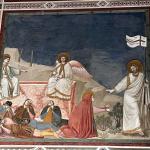INTRODUCTION
One of the great evils of American Christianity is the idolization of the family. American Christians believe that blood is thicker than baptismal water, and that the family is a redemptive institution. But the primary family for Christians is the “brotherhood” of the church, and Jesus stressed that discipleship may require breaking ties with the blood family (Matthew 10:35-37; Luke 14:26). Though families are not redemptive in themselves, through the gospel they are redeemed and become powerful agents for redemption. Our aim here in Moscow is to build strong churches composed of healthy families.
THE TEXT
“Submit to one another out of reverence for Christ. Wives, submit to your husbands as to the Lord. For the husband is the head of the wife as Christ is the head of the church, his body, of which he is the Savior. Now as the church submits to Christ, so also wives should submit to their husbands in everything . . . .” (Ephesians 5:21-6:9).
HEAD AND BODY
Paul draws on two related models to describe the diversity of roles in marriage. The first is the model of Christ and His church. Marriages are inherently symbolic, inherently typological, and for good or ill reflect the reality of Christ’s relationship with His bride. The second model comes from Genesis 2, which describes the “one flesh” relationship between a husband and wife. Since Jesus is the Last Adam, Paul understands Genesis 2 to be mainly about Him, so the two models are ultimately one.
One of the links between these two models is the relationship of “head” and “body.” Headship involves authority and leadership, but in Scripture headship also involves initiative in time – Adam came first. A husband, like Christ, is called to exercise authority in the home, and also is responsible for setting the direction and trajectory of the family. According to Paul, his authority and initiative must be modeled on Christ’s headship over the church. Christ does not exercise authority over the church to advance or preserve His own interests. On the contrary, He exercises authority with a view to the best interests of His bride. He pursues the interests of His bride even to the point of death.
In Genesis 2, one of the key aspects of Adam’s headship has to do with being a guard (2:15; the word “keep” means “guard”). A husband not only physically guards his wife, but guards her (and the family) from anxiety, insecurity, and serpents at the door. Adam’s sin was a failure to guard his bride, and many husbands repeat Adam’s fall in their homes every day.
As the church is called to be subject to Christ, so wives are called to submit to their husbands in “fear” (v. 33). Paul is not saying that wives need only respect their husbands but not love them, nor that husbands should love their wives disrespectfully. He is saying that a wife’s love takes a different form than a husband’s love. A husband’s love takes the form of self-sacrificing leadership; a wife’s love takes the form of respectful submission.
The “one-fleshness” of husband and wife is symbolized by sexual union, but there’s much more to it. Husbands and wives should be pursuing intimacy and unity across the board, not merely in bed. Many married couples drift, and when they drift they drift apart. Pursuing unity takes time, and that time needs to be taken.
FATHERS AND CHILDREN
Paul repeats the fifth commandment, emphasizing that honor to father and mother means obedience (6:1-2). God promises that those who obey this commandment will be rewarded with long life. As children grow, the shape of this commandment varies. When a child marries and establishes a new home, parents do not have the right to command. But even grown and married children are required to honor parents in both attitude and in action.
The family is a key to the formation of Christian culture, because it is largely in the family that Christian culture gets passed from one generation to the next. Paul instructs fathers particularly to raise children in the paedeia of God (6:4). This Greek word includes the notion of discipline, including corporal discipline, but has the wider connotation of “enculturation.” Christian children learn Christian habits of thought and conduct through the teaching and corporal discipline administered by their parents. Paul singles out fathers; they are primarily responsible for this take. Though mothers clearly have a central role in education and training, raising children is not women’s work.
Paul warns fathers not to provoke children to wrath (v. 4). There are two main ways this can happen. On the one hand, a harsh and wrathful father will provoke a corresponding harshness from his children. Watch how your kids treat each other, and you’ll learn something about how you are treating them. On the other hand, an indulgent and wimpy father is equally frustrating, especially to boys. Fathers, discipline with firm love, with loving firmness.
SERVICE TO THE LORD
Christian culture must extend also to working relationships. In Paul’s day, Christian slave-owners were supposed to treat their Christian slaves as fellow-servants of one Master, and Christian slaves were supposed to work hard even for harsh masters (6:5-7; 1 Peter 2:18). It is appropriate to translate this into employer-employee relations in our day. Christian employers must renounce threats and bullying and blackmail, and Christian employees are called to work hard, knowing that they ultimately serve Christ.















